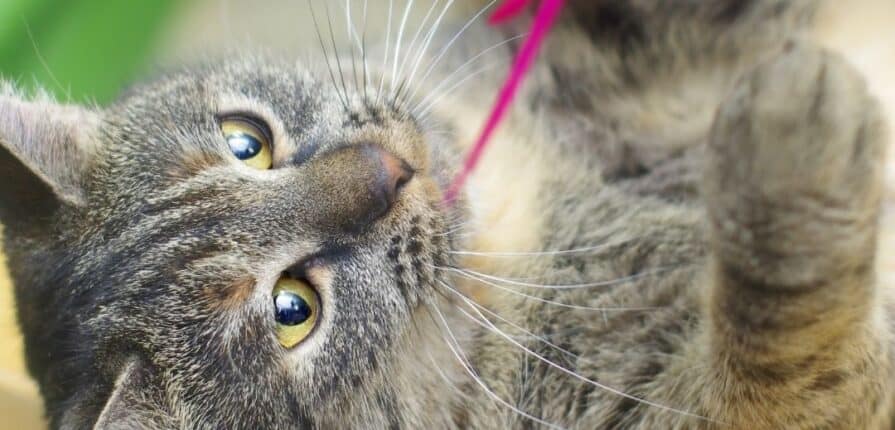
How to play with your indoor cat!
At Equipaws, a lot of our pack is comprised of pups (and a few bipeds), but we also have kitties in the family! As such, this blog is for our feline pals and their parents, who know that bringing a cat into their home is a significant commitment. We want to help you provide a happy and healthy environment for your cat, not only for the cat’s sake, but for yours as well. A happy cat is a calm cat that will kick destructive habits to the curb; an indoor cat is a happy, safe cat! Read on for tips on keeping your indoor cat healthy and entertained.
Why Should I Keep My Cat Indoors?
Simply put, the average lifespan of an outdoor cat is 2-3 years, whereas the average indoor cat can live 15-20 years! Some cat parents feel guilty about restricting their cat to the [truly] great indoors, but considering what’s out there in the not-so-great outdoors, cats have a much better life inside their cozy homes. Cars, other wildlife, diseases, traps meant for other critters, unsavory humans, poisonous chemicals, parasites – cats are at the mercy of all of these things when left to roam free on their own. Keeping your cat indoors offers them (and many birds and other small outdoor animals) a chance at a long and happy life.
How to Keep Your Indoor Cat Entertained
However, despite a cat’s independent nature and general disposition which is often read as “aloof,” cats need lots of interaction and stimulation to keep them fit, healthy, and happy.
- Make sure your indoor kitty has a lot of toys. You don’t have to go the expensive route – cats love paper bags, boxes, twist ties, shoelaces, long strips of fabric (an old t-shirt you can cut, perhaps), a feather attached to a string, etc. Cats are great at making their own fun and can entertain themselves for hours with the most seemingly insipid house objects. Hide some of these around your house for your cat to find. They are not so different from us in that they appreciate the variety.
- Cats love climbing! Cat trees, kitty condos, cat gyms – whatever you want to call them, they are wonderful for cats, who have a penchant not only for climbing, but for elevated vantage points. Many of these also have a roped or otherwise rough material binding in the center that cats can claw at. Scratching feels great for cats, and it is part of their natural behavior. Scratchers (which are available in many varieties, not just as part of kitty condos) also help to curb destructive furniture scratching. (Please do not declaw your cat!)
- Let the sun shine in! Cats love windows. They like the warmth of the sun and they like to look at what’s going on in the outside world. Make sure your cat has access to a few window sills throughout the house. If you are leaving the windows open for some fresh air, make sure your screen is secure!
- Herbs. If you have a cat and have had an indoor plant at some point, you have probably figured out that the plants don’t last long in your cat’s wake. Many cats take to chewing on plants, and many household plants can be toxic for cats. If your cat has shown interest in destroying your plants, but you want some green around the house that is safe, many pet stores and hardware stores sell cat-friendly herbs (such as catnip, wheatgrass, and oat grass). It’s a surefire alternative to trying to place your favorite plants out of the cat’s reach (since we know what clever climbers they are).
We saved the best for last: Cats love playtime with YOU!
Make sure to engage your cat often. They appreciate their toys, but like them more so when you are on the other end of them. One thing everyone knows: cats are little predators. Introduce wands with imitation prey at the end, and let them catch them every so often, for that satisfying “kill.” Playtime with you keeps your cat mentally stimulated as well as physically active… and builds the bond between you two.
How to play with wands:
- Get a Handle on Safety: Look for a wand toy with a long handle, sometimes even a cord or wire, which keeps your hands at a secure distance from the action.
- Light & Nimble: Choose a small and lightweight toy for easy catching and control over movements.
- Prey Lookalikes: Cats are captivated by feathered or fur-mimicking fabric toys.
- Watch Out for: toys with bells or small parts like plastic eyes that could be ingested, ensuring your furry friend’s safety.
- Sound of the Hunt: Toys producing prey-like sounds (think high-pitched ‘cheeps’ or ‘squeaks’) add a thrilling twist to playtime
- Soar Like a Bird: Mimic bird-like swoops in the air, capturing that flighty essence.
- Catch & Release: Let your cat catch the toy occasionally; this keeps the game engaging and challenging.
- Spice It Up: Keep the excitement alive with a variety of wand toys; it keeps your cat’s curiosity piqued.
- Personal Playtime: If you have multiple cats, play individually to honor their solitary hunting nature.
Your cat will surely be responsive to many kinds of toys – it is all a matter of learning what s/he likes best. When stimulated, your cat will run around and pounce. It’s important for your sedentary feline to get moving, as indoor cats don’t get nearly as much exercise as their outdoor counterparts. Fat cats may be cute, but obesity poses severe threats to all living things, such as heart disease, joint problems, and a shorter lifespan, among other complications.
We’d be happy to answer any questions you have about cat care, cat sitting, or cat exercise! Give us a call at 305-794-3733, or email us at info@equipawspetservices.com, today!

A founding member of the Equipaws family, Frankie can mostly be found working behind the scenes, helping co-create online branding, managing several social media accounts, designing brand collateral, writing copy, and managing events. She also fills in for pet sitters and dog walkers when needed in Palmetto Bay, Pinecrest, and South Miami. Her own small pack consists of Boots the Shih Tzu mix and Nutmeg the Chiweenie.

